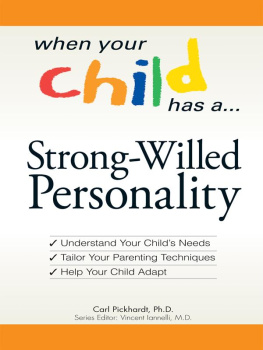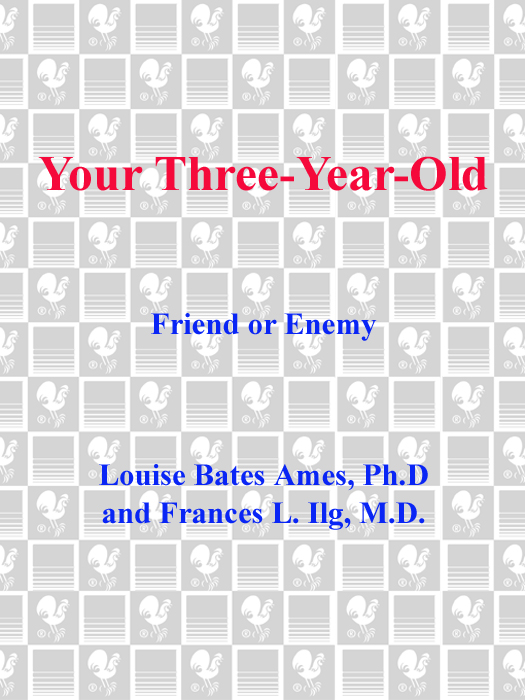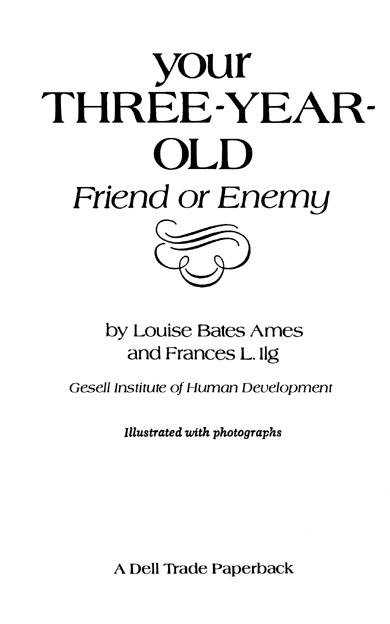A Dell Trade Paperback
Published by
Dell Publishing
a division of
Bantam Doubleday Dell Publishing Group, Inc.
1540 Broadway
New York, New York 10036
Copyright 1985 by Louise Bates Ames and Carol Chase Haber
Photographs copyright 1985 by Betty David
All rights reserved. No part of this book may be reproduced or transmitted in any form or by any means, electronic or mechanical, including photocopying, recording or by any information storage and retrieval system, without the written permission of the Publisher, except where permitted by law.
For information address Delacorte Press, New York, New York.
The trademark Dell is registered in the U.S. Patent and Trademark Office.
eISBN: 978-0-307-81340-4
Reprinted by arrangement with Delacorte Press
v3.1
CAN
YOUR THREE-YEAR-OLD
MAKE YOU A HAPPIER, LESS STRESSED,
AND MORE EFFECTIVE PARENT?
YOU BET!
FIND OUT ABOUT
The major behavior change to expect at Three-and-a-half its inevitable, its tough on parents, but you can handle it wisely if you know how. See .
Why, when your child says, I dont love you, you shouldnt take it to heart. Learn what it means and how to respond. See .
Whining its a hallmark of Three-and-a-half-year-olds, it can drive you crazy, but it can be stopped, gently and effectively. Discover the secret. See .
Power struggles at mealtime this battle between mother and child can be stopped before it begins. Read about techniques that really work. See .
Thumb-sucking is this babyish habit becoming an issue? Discover what you can do about it and how you can predict when it will finally end. See .
Supercreative kids the activities you can initiate to give your child a boost in verbal and cognitive skills and have a great time too! See .
and more!
YOUR THREE YEAR-OLD
I think [these books] are delightful and likely to capture the imagination of young parents enough to get them through these years. I think the books will be both a pleasure and support for many parents.
T. Berry Brazelton, M.D., author of Toddlers and Parents and Infants and Mothers
These are cheerful, optimistic books. I agree with just about everything they say.
Lendon Smith, M.D., author of Feed Your Kids Right
Books from The Gesell Institute of Human Development
YOUR ONE-YEAR-OLD
Ames, Ilg, and Haber
YOUR TWO-YEAR-OLD
Ames and Ilg
YOUR THREE-YOUR-OLD
Ames and Ilg
YOUR FOUR-YEAR-OLD
Ames and Ilg
YOUR FIVE-YEAR-OLD
Ames and Ilg
YOUR SIX-YEAR-OLD
Ames and Ilg
YOUR SEVEN-YEAR-OLD
Ames and Haber
YOUR EIGHT-YEAR-OLD
Ames and Haber
YOUR NINE-YEAR-OLD
Ames and Haber
YOUR TEN- TO FOURTEEN-YEAR-OLD
Ames, Ilg, and Baker
To our daughters,
Joan and Tordis,
and our grandchildren,
Carol, Clifford, Karl, and Whittier
CONTENTS
chapter one
CHARACTERISTICS OF THE AGE
Just as the tides have their rhythms, so does human behavior have its own predictable rhythms. As the child grows older, good ages alternate with bad; times of equilibrium alternate with times of disequilibrium; and periods when behavior tends to be expansive and outgoing alternate with periods when everything seems to be pulled in.
It should come as no surprise, then, to the mother or father of a rambunctious Two-and-a-half-year-old, that sometime around the age of Three their son or daughter does seem to calm down conspicuously. He says yes instead of no; will instead of wont. He smiles instead of frowns, laughs instead of cries, gives in comfortably to your requests instead of resisting them.
Around thirty-three months of age, many children go through a stage of reliving their babyhood, of thinking about themselves in terms of their own past. The child may pretend that he is a baby, even going back to the use of baby talk, though some are loath to give up their glorious acquisition of speech. So, a child may say, Im a little baby. I cant walk, I have no teeth, I drink from a bottle. But I can talk.
However, by Three, most have caught up with themselves chronologically and are now in a state of equilibrium and of no longer looking back. In fact, by Three, many children seem to be developing a rather good self-concept, seem to have a solid set of feelings about themselves. There is little question that this sense of self is influenced by the way others treat them.
At thirty months the opposition of I and you was so strong that there seemed to be a chasm between them, with the opposition of Me do it myself when he really could not, and You do it when he actually could do a thing himself. But at Three years of age the chasm seems to be bridged by that delightfully cooperative word we.
In fact, Three is a highly we age. The child likes to say lets, as Lets go for a walk, shall we? The sense of togetherness or we-ness seems to make him depend on the adult and makes him lean on him or her, though he also enjoys the sense of sharing. The very child who has been so independent earlier may now ask his mother: Help me, Show me.
But even though the increased maturity of Three allows him sometimes to share or even lean instead of resisting, as earlier, Three is also aware of and proud of his increasing maturity and increasing ability. He frequently asks, after some particular display of prowess, Could a baby do this?
Dr. Arnold Gesell has described Three as a coming of age, a time at which the many strands of previous development converge, and a new self comes into focus. The conflicting extremes of six months ago give way to a high degree of smoothness, integration, and self-control. Emotions are well in hand.
Three seems, for all his relative immaturity, to be rather highly aware of what other people like and do not like. In fact, many seem quite able to tell whether another person is happy or sad, pleased or angry, by watching that persons face.
At any rate, the typical Three-year-old wants to please. He wants to do things right. Do it dis way? he may ask hopefully. He is highly susceptible to praise and favourable comment and also highly responsive to friendly humor.
The increased smoothness seen in the typical child of Three has a strongly motor basis. His body is now delightfully at his command. It does not surprise him with inadequacy as it has done in the past and will do again in another six months or so, when motor insecurity seems to lie at the basis of much of the marked emotional insecurity the Three-and-a-half-year-old exhibits.
Three is sure and nimble on his feet. He walks well, and he runs easily. He can turn sharp corners without elaborate preparation and precaution. His motor sureness is evident even as he walks. He no longer stretches his arms out for balance but instead walks securely and swings his arms with ease.
Three now enjoys other children, but most of all he enjoys his mother. He loves to do things with hergo for a walk, go to the store, help with housework, and, above all, play. He is happiest when his mother finds it possible to give up other activities and concentrate on him. Almost anything the two of you do together brings him joy. It is bliss to have Mother read to him, play games with him, talk to him, just be near him.




